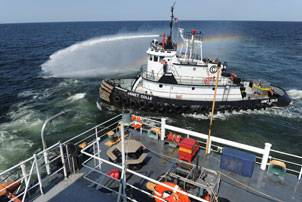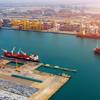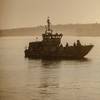Gulf Oil Spill: Ships Face Few Delays
By Susan Buchanan
As oil from BP's sub-sea well laps coastal Louisiana, most ships in the Gulf have avoided contact with the spill but owners fear that regulations will be tightened after the disaster, raising their costs.
“We've seen no delays from the spill, and it hasn't affected the operations of any of our ships,” said Dean Taylor, president of Tidewater Inc. in late May. Four vessels owned by Tidewater, which is headquartered in New Orleans, have been involved in recovery efforts. The company's work boat Damon B. Bankston rescued 115 crew members from BP's Deepwater Horizon platform when it went up in flames in late April.
“Two of our boats have delivered topkill and dispersants to the spill site,” Taylor said. BP used topkill or heavy mud to try to plug the flow of oil from its underwater well. Meanwhile, another Tidewater boat, the M/V War Admiral, is monitoring ocean currents on behalf of BP to watch the direction of oil plumes. With 394 vessels, Tidewater owns the biggest, international fleet devoted to the offshore-energy industry.
At the Mississippi River's mouth in Venice, La., Captain Michael Fitzpatrick, stationed with Associated Branch Pilots, said “so far we've been extremely lucky and have seen few delays to traffic.” Branch pilots guide vessels through the lower part of the river. “One inbound ship that was drifting because of engine damage had to be decontaminated” or cleaned, he said. “And an outbound passenger ship was decontaminated to meet requirements at its next port.”
Fitzpatrick said ship crews read the spill information posted daily on the National Oceanic and Atmospheric Administration's website to navigate around waterborne oil. “Crews on inbound ships that we've encountered entering the Mississippi River say they've seen very little oil,” he said in late May. “But other ports are starting to require that ships coming from the Gulf and the mouth of the Mississippi be decontaminated.”
Reports in early May of spill-related delays to shipping a huge, space-shuttle fuel tank by water from the Michoud Assembly Facility in New Orleans to the Kennedy Space Center in Florida were inaccurate, the National Aeronautics and Space Administration said in early June. The tank's departure on the NASA barge Pegasus was delayed by a few days because of high winds in the New Orleans area, not the spill, according to a NASA spokesman.
Cleaning Stations Opened for Vessels
In the New Orleans suburb of Metairie, Kevin LaGraize, president of Southport Agencies Inc., river steamship agents, said, “we haven't experienced problems or delays to vessels so far. The Coast Guard has contingencies in place, including stations for cleaning hulls of any ships that need it so that oil isn't tracked into the river.”
A light, oil sheen has been seen intermittently in the area near the entrance to Southwest Pass, the main, deep-draft passage to the Mississippi River, Port of New Orleans spokesman Chris Bonura said in late May. “Generally, however, vessels have been able to either avoid affected areas, or oil hasn't clung to their hulls,” he said. If boats do need cleaning, four stations have been opened in shipping lanes that are either in or lead to the Mississippi River, and cleaning stations have been set up at other Gulf Coast ports too.
“Should it become necessary, the focus will be on cleaning vessels quickly to accommodate maritime commerce with minimal delays,” Bonura said. “One tanker that was contaminated had to anchor in an affected area, and was delayed for about thirty minutes so that it could be cleaned. But no vessel calls have been canceled and no ships have been diverted to other ports.”
The three, inbound cleaning stations include one that's four miles below Southwest Pass and able to knock heavy material off vessels coated with thick oil. A station in Southwest Pass is for ships in transit that need pressure washing, and one is located in the Venice-Boothville, La. area for anchored vessels. An outbound, offshore station using pressurized water to clean hulls of boats is located near a shipping lane outside of the spill.
On the Gulf Intracoastal Waterway, a cleaning station at mile-marker 33 has been established in case transiting vessels have to be cleaned.
Paul Clancey, district manager at Transmarine Navigation Corp., a steamship agency in Gretna, La., said “the oil spill hasn't affected my business or accounts. Some foreign vessels may be staying away from this region based on the perception that that they could get stuck or slowed in the Gulf or lower Mississippi River. But they're simply erring on the side of caution.”
For the full story, turn to the June 2010 edition of Maritime Reporter & Engineering News.













